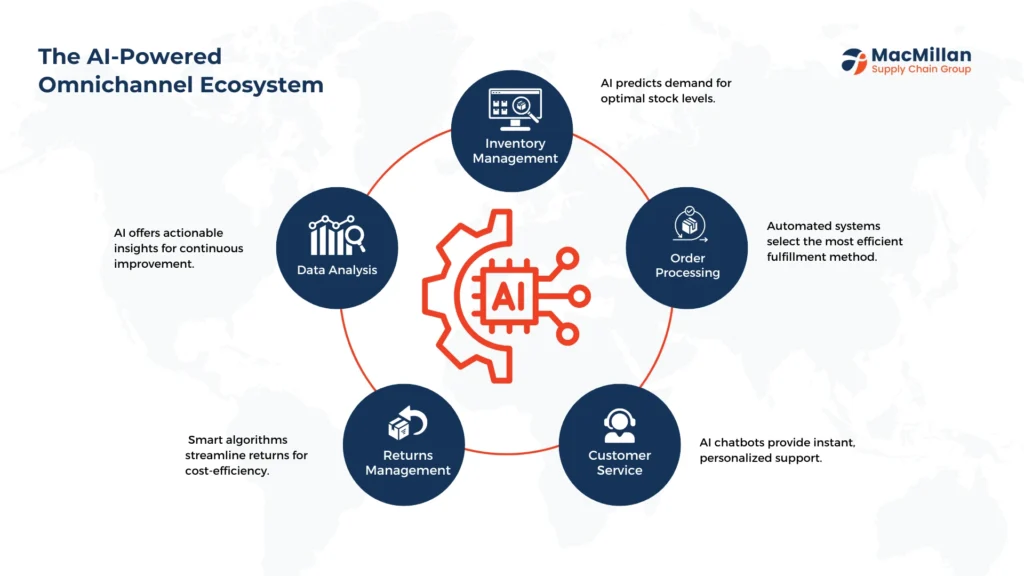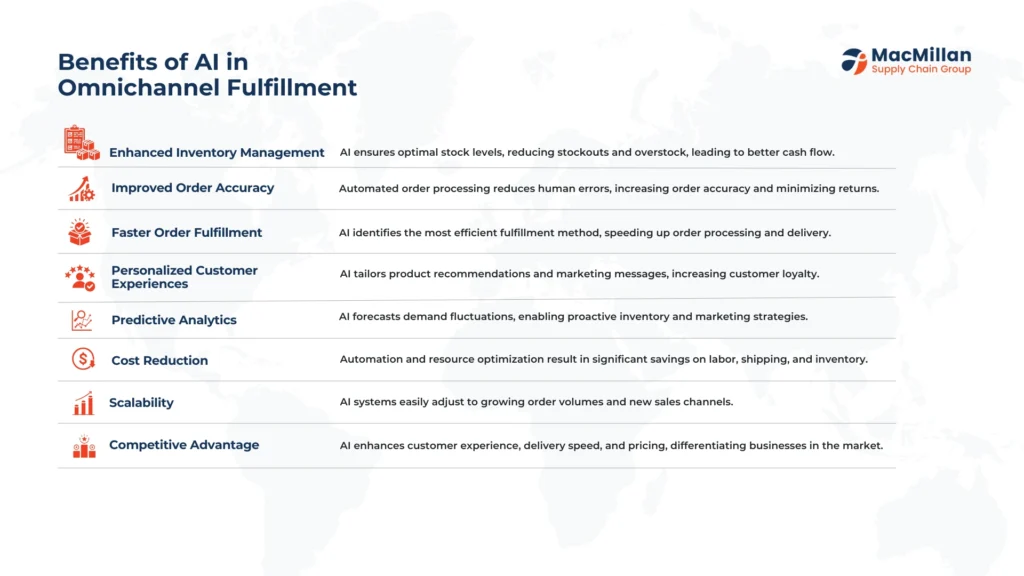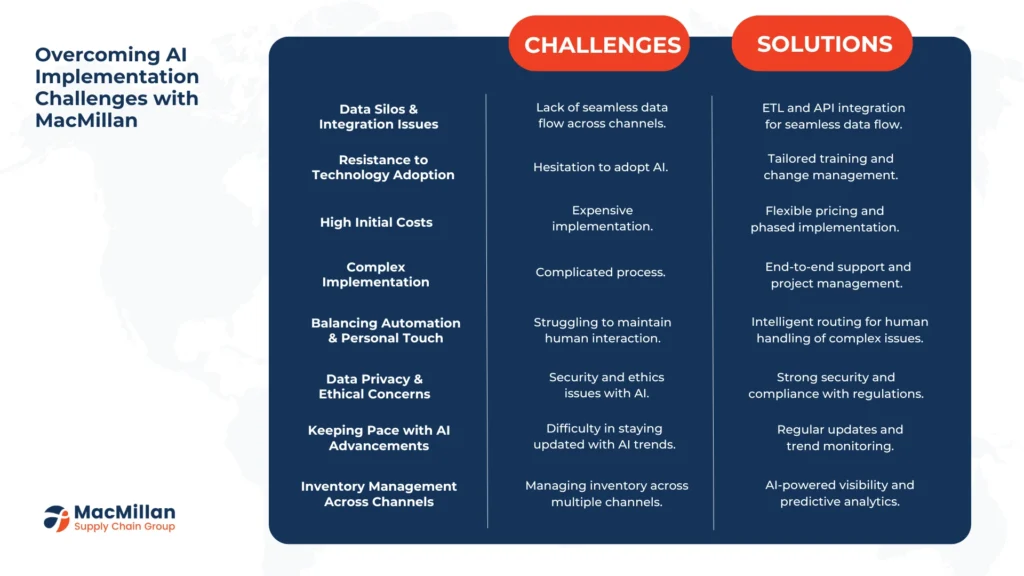A quick summary and overview
Omnichannel fulfillment powered by AI is reshaping the e-commerce landscape, offering businesses unprecedented efficiency and customer satisfaction. This comprehensive guide explores the integration of AI in omnichannel strategies, highlighting its transformative impact on inventory management, order processing, and customer service. We delve into implementation strategies, discuss common challenges, and provide solutions to help businesses thrive in the competitive e-commerce market. With insights from MacMillan Supply Chain Group, a leader in innovative supply chain solutions, this article offers valuable knowledge for companies looking to leverage AI and omnichannel fulfillment to stay ahead in the digital retail space.
An introduction
In today’s fast-paced e-commerce environment, businesses are constantly seeking ways to streamline operations, reduce costs, and enhance customer experiences. The integration of AI in omnichannel fulfillment presents a game-changing solution to these challenges. By unifying various sales channels and leveraging artificial intelligence, companies can create a seamless, efficient, and responsive supply chain that meets the ever-evolving demands of modern consumers.
This article explores the transformative potential of AI in omnichannel fulfillment, offering insights into its implementation, benefits, and the solutions it provides to common e-commerce pain points. Drawing on the expertise of MacMillan Supply Chain Group, we’ll guide you through the intricacies of this innovative approach, helping you understand how it can revolutionize your e-commerce operations and drive sustainable growth in an increasingly competitive digital marketplace.

Understanding AI-Powered Omnichannel Fulfillment
AI-powered omnichannel fulfillment represents the convergence of artificial intelligence and integrated sales channel management. This approach aims to create a unified, intelligent system that seamlessly connects various touchpoints in the customer journey, from online marketplaces and social media platforms to brick-and-mortar stores.
At its core, AI-powered omnichannel fulfillment leverages machine learning algorithms and data analytics to optimize every aspect of the supply chain. This includes:
- Inventory Management: AI analyzes historical data and market trends to predict demand, ensuring optimal stock levels across all channels.
- Order Processing: Intelligent systems automate order routing, selecting the most efficient fulfillment method based on factors like location, inventory availability, and delivery timeframes.
- Customer Service: AI-powered chatbots and virtual assistants provide instant, personalized support across multiple platforms, enhancing customer satisfaction.
- Returns Management: Smart algorithms streamline the returns process, minimizing costs and improving the customer experience.
- Data Analysis: AI continuously analyzes performance metrics, providing actionable insights for continuous improvement.
By integrating these AI-driven processes, businesses can achieve a level of operational efficiency and customer responsiveness that was previously unattainable. This holistic approach not only reduces costs and minimizes errors but also creates a seamless, personalized shopping experience that meets the high expectations of today’s consumers.

Benefits of Implementing AI in Omnichannel Fulfillment
The integration of AI in omnichannel fulfillment offers numerous advantages that can significantly impact a business’s bottom line and customer satisfaction levels:
- Enhanced Inventory Management: AI-powered systems provide real-time visibility across all channels, reducing stockouts and overstock situations. This leads to optimized inventory levels, lower carrying costs, and improved cash flow.
- Improved Order Accuracy: By automating order processing and routing, AI minimizes human error, resulting in higher order accuracy rates and reduced return rates.
- Faster Order Fulfillment: AI algorithms can determine the most efficient fulfillment method for each order, reducing processing times and improving delivery speed.
- Personalized Customer Experiences: AI analyzes customer data to provide tailored product recommendations and personalized marketing messages, increasing customer engagement and loyalty.
- Predictive Analytics: AI-driven forecasting helps businesses anticipate demand fluctuations, enabling proactive inventory management and marketing strategies.
- Cost Reduction: Automation of routine tasks and optimization of resource allocation lead to significant cost savings in labor, shipping, and inventory management.
- Scalability: AI-powered systems can easily adapt to growing order volumes and new sales channels, supporting business expansion without proportional increases in operational costs.
- Competitive Advantage: Businesses leveraging AI in omnichannel fulfillment can offer superior customer experiences, faster deliveries, and more competitive pricing, setting them apart in the marketplace.
Implementing AI-Driven Omnichannel Fulfillment Strategies
Successfully implementing AI-driven omnichannel fulfillment requires a strategic approach and careful planning. Here are key steps to consider:
- Assess Current Infrastructure: Evaluate your existing systems and identify areas where AI can make the most significant impact. This may include inventory management, order processing, or customer service.
- Data Integration: Ensure all your sales channels and backend systems are integrated to provide a unified data stream for AI analysis. This may require upgrading or replacing legacy systems.
- Choose the Right AI Solutions: Select AI tools that align with your specific business needs and can integrate seamlessly with your existing infrastructure. Consider factors like scalability, customization options, and vendor support.
- Pilot Implementation: Start with a small-scale implementation to test the AI system’s effectiveness and identify any potential issues before full-scale deployment.
- Staff Training: Provide comprehensive training to your team on how to work alongside AI systems and interpret AI-generated insights.
- Continuous Monitoring and Optimization: Regularly analyze the performance of your AI-driven processes and make adjustments as needed to ensure optimal results.
- Customer-Centric Focus: Always prioritize the customer experience when implementing new AI technologies. Ensure that automation enhances rather than hinders customer interactions.
- Compliance and Security: Implement robust security measures to protect customer data and ensure compliance with relevant regulations.
By following these steps, businesses can successfully integrate AI into their omnichannel fulfillment strategies, paving the way for improved efficiency, customer satisfaction, and competitive advantage.

Overcoming Challenges in AI-Powered Omnichannel Fulfillment
While the benefits of AI-powered omnichannel fulfillment are significant, businesses may encounter several challenges during implementation and operation:
- Data Quality and Integration: AI systems rely on high-quality, integrated data. Many businesses struggle with siloed data systems or inconsistent data across channels.
- Technology Adoption: Resistance to change among staff or difficulty in adapting to new AI-driven processes can hinder successful implementation.
- Initial Costs: The upfront investment in AI technology and infrastructure can be substantial, potentially deterring some businesses.
- Complexity of Implementation: Integrating AI across multiple channels and systems can be complex, requiring specialized expertise.
- Maintaining the Human Touch: Over-reliance on AI may lead to a loss of personal connection with customers, potentially affecting brand loyalty.
- Ethical Concerns: The use of AI in customer data analysis raises privacy and ethical concerns that businesses must address.
- Keeping Pace with AI Advancements: The rapid evolution of AI technology requires businesses to continually update and adapt their systems.
- Balancing Automation and Human Oversight: Determining the right balance between AI automation and human decision-making can be challenging.
Overcoming these challenges requires a strategic approach, ongoing commitment to technological advancement, and a focus on maintaining a customer-centric approach. By addressing these issues proactively, businesses can maximize the benefits of AI-powered omnichannel fulfillment while minimizing potential drawbacks.
Common problems with the topic
Our solutions
While AI-powered omnichannel fulfillment offers tremendous potential, businesses often encounter several common problems during implementation and operation. At MacMillan Supply Chain Group, we’ve developed comprehensive solutions to address these challenges:
Problem: Data Silos and Integration Issues
Solution: Our team of experts conducts a thorough assessment of your existing systems and develops a customized data integration plan. We utilize advanced ETL (Extract, Transform, Load) processes and API integrations to create a unified data ecosystem, ensuring seamless information flow across all channels.
Problem: Resistance to Technology Adoption
Solution: We offer comprehensive change management services, including tailored training programs and ongoing support to help your team embrace new AI-driven processes. Our approach focuses on demonstrating the tangible benefits of AI implementation, fostering a culture of innovation within your organization.
Problem: High Initial Costs
Solution: MacMillan Supply Chain Group offers flexible pricing models and phased implementation plans to distribute costs over time. We also help you identify and prioritize high-impact areas for AI implementation, ensuring a quicker return on investment.
Problem: Complex Implementation Process
Solution: Our experienced project management team guides you through every step of the implementation process. We provide end-to-end solutions, from initial planning and system design to deployment and post-implementation support, simplifying the transition to AI-powered omnichannel fulfillment.
Problem: Balancing Automation and Personal Touch
Solution: We design AI systems that enhance rather than replace human interactions. Our solutions include intelligent routing of customer inquiries, ensuring complex issues are handled by human agents while routine tasks are automated, maintaining a perfect balance of efficiency and personalization.
Problem: Data Privacy and Ethical Concerns
Solution: MacMillan Supply Chain Group prioritizes data security and ethical AI use. We implement robust security measures, ensure compliance with data protection regulations, and provide transparent AI decision-making processes to address ethical concerns.
Problem: Keeping Pace with AI Advancements
Solution: Our ongoing support and maintenance services include regular system updates and upgrades. We continuously monitor AI trends and advancements, providing recommendations for system enhancements to keep your omnichannel fulfillment strategy at the cutting edge.
Problem: Inventory Management Across Multiple Channels
Solution: Our AI-powered inventory management system provides real-time visibility across all channels. It uses predictive analytics to optimize stock levels, automate reordering processes, and dynamically allocate inventory based on demand forecasts and channel performance.
By partnering with MacMillan Supply Chain Group, you gain access to our wealth of experience and innovative solutions, enabling you to overcome the common challenges associated with AI-powered omnichannel fulfillment. Our comprehensive approach ensures that your business can fully leverage the power of AI to enhance operational efficiency, improve customer satisfaction, and drive sustainable growth in the competitive e-commerce landscape.
How can reader avoid problem or implement solution
To avoid the pitfalls and maximize the benefits of AI-powered omnichannel fulfillment, businesses should consider partnering with experienced professionals who understand the intricacies of this complex field. MacMillan Supply Chain Group offers the expertise and innovative solutions you need to successfully implement and optimize your omnichannel strategy.
By working with MacMillan, you can:
- Leverage our extensive experience in supply chain management and AI integration
- Access customized solutions tailored to your specific business needs
- Benefit from our comprehensive implementation support and ongoing maintenance services
- Stay ahead of the curve with our cutting-edge AI technologies and continuous innovation
Don’t let the challenges of AI implementation hold your business back. Take the first step towards revolutionizing your e-commerce operations today.
Contact MacMillan Supply Chain Group now to schedule a consultation with our experts. We’ll assess your current operations, identify areas for improvement, and develop a customized AI-powered omnichannel fulfillment strategy that drives efficiency, enhances customer satisfaction, and boosts your bottom line.
Visit our website or call us at 416-941-2759 to learn how MacMillan Supply Chain Group can help you harness the power of AI for your e-commerce success. Let’s work together to transform your supply chain and set your business apart in the competitive digital marketplace.
FAQs
AI-powered omnichannel fulfillment is an advanced approach to e-commerce operations that uses artificial intelligence to integrate and optimize various sales channels, inventory management, order processing, and customer service. It aims to create a seamless, efficient, and personalized shopping experience across all touchpoints.
AI analyzes historical data, market trends, and real-time sales information to predict demand accurately. This enables businesses to optimize stock levels across all channels, reduce stockouts and overstock situations, and automate reordering processes, leading to improved inventory turnover and reduced carrying costs.
Yes, AI-powered solutions can be scaled to suit businesses of all sizes. MacMillan Supply Chain Group offers flexible solutions that can be tailored to the needs and budget of small businesses, allowing them to benefit from AI technology without overwhelming their resources.
AI-powered chatbots and virtual assistants can provide instant, 24/7 customer support across multiple channels. These systems can handle routine inquiries, freeing up human agents to deal with more complex issues. AI also enables personalized product recommendations and tailored marketing messages based on customer data analysis.
Common challenges include data integration issues, resistance to technology adoption, high initial costs, complexity of implementation, and maintaining a balance between automation and human touch. MacMillan Supply Chain Group provides comprehensive solutions to address these challenges, ensuring a smooth transition to AI-powered operations.
The implementation timeline can vary depending on the complexity of your existing systems and the scope of the project. Generally, it can take anywhere from a few months to a year. MacMillan Supply Chain Group offers phased implementation plans to ensure minimal disruption to your operations and quicker realization of benefits.
AI automates order routing and processing, reducing human error and optimizing fulfillment methods. It can determine the most efficient fulfillment location and method for each order based on factors like inventory availability, shipping distance, and delivery timeframes, leading to improved accuracy and faster processing times.
While ROI can vary depending on the specific implementation and business context, many companies see significant improvements in operational efficiency, reduced costs, and increased sales. Common benefits include reduced inventory carrying costs, improved order accuracy, faster fulfillment times, and enhanced customer satisfaction, all of which contribute to a strong ROI.
